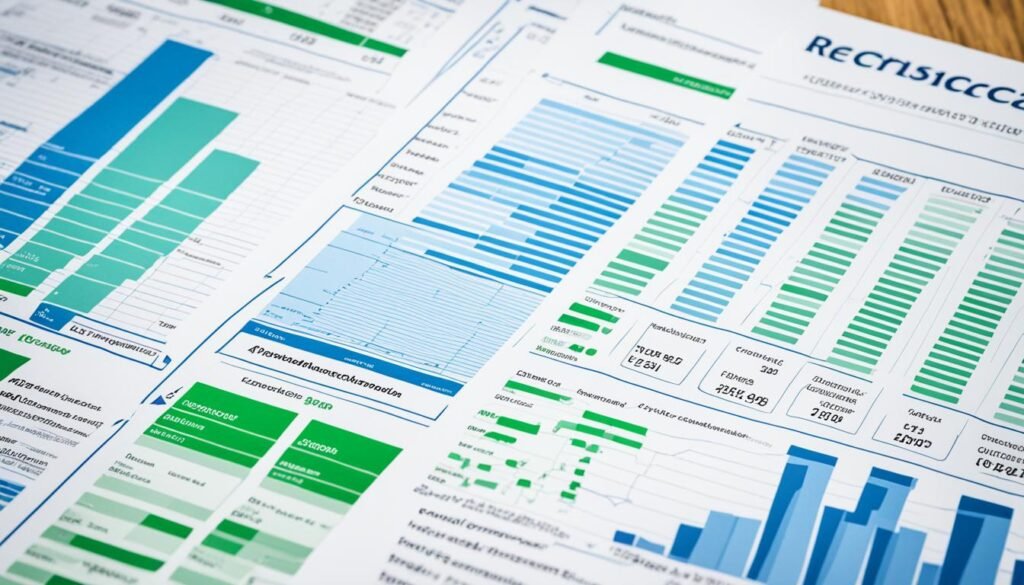Did you know over 30% of small businesses fail in the first two years? This is often because of poor financial management. Good bookkeeping is key to your business’s financial health and success. It helps you track cash flow, control expenses, and get ready for tax season.
Bookkeeping is key to managing a small business’s money. It means recording and organizing all money coming in and going out. This includes things like income, expenses, and bills. Keeping accurate small business bookkeeping records is vital for taxes, making smart business choices, and keeping track of money.
Bookkeeping for small businesses means tracking money activities. This includes:
Having good accounting for small businesses through bookkeeping is key for many reasons:
“Proper bookkeeping practices are the backbone of a small business’s financial health and long-term success.”
Choosing the right accounting software for small businesses is key. You’ll need to add your company details like name and tax ID. Also, link your bank and credit cards to the software.
Popular bookkeeping software for small businesses include QuickBooks, FreshBooks, and Xero. Think about how easy it is to use, what reports it gives, how it works with other apps, and the cost. Setting up your accounting software right makes bookkeeping easier and keeps your finances right.
When picking accounting software for small businesses, think about what you need. Look at these things:
After choosing your accounting software, add your business information and link your bank and credit cards. This means:
Getting your accounting software set up right helps with bookkeeping and managing money. It keeps you organized and informed about your business’s money health.
Choosing the right accounting system is key for small businesses. Let’s look at single-entry and double-entry accounting, and cash and accrual basis accounting.
Single-entry and double-entry accounting are the main types. Single-entry records each transaction once. Double-entry records them twice, as debits and credits. Double-entry gives a fuller view of your finances but is harder to manage.
The choice depends on your business’s size and complexity.
You also need to pick between cash basis and accrual basis accounting. Cash basis records transactions when money is exchanged. Accrual basis records income and expenses when earned or incurred.
Accrual basis is better because it follows accounting rules and shows a true financial picture.
| Accounting System | Accounting Method |
|---|---|
| Single-entry | Cash basis |
| Double-entry | Accrual basis |
The right accounting system and method depend on your business’s size and needs. Think about the pros and cons to find the best fit for you.
“Proper bookkeeping is the foundation of a successful small business. Choosing the right accounting system and method can make all the difference in managing your finances effectively.”
As a small business owner, it’s key to manage your money well. This means keeping track of your financial dealings and making sure your books are right. By getting your business money into your accounting system right, you keep accurate records. This helps you understand your company’s money situation.
Start by bringing your business money info from your bank and credit cards into your accounting software. This makes things easier and cuts down on mistakes. After you get the info in, sort each transaction as income, expense, or something else. Getting it right is important for correct money records and useful reports.
It’s important to check your business money often. Compare what’s in your accounting with your bank statements. This helps find any mistakes, missed bills, or wrong buys. Checking your accounts often keeps your bookkeeping right and stops future problems.

“Regular account reconciliation is a vital practice for small businesses to maintain financial integrity and detect any errors or irregularities.” – Jane Doe, Certified Public Accountant
Keep an eye on your money and check your accounts often. This helps you manage your business money well. It also helps you make smart choices for your company’s growth.
As a small business owner, you must keep an eye on your accounts receivable and accounts payable. This helps keep your cash flow healthy. Accounts receivable management means sending invoices on time, following up on late payments, and tracking what’s owed to you. Automating your invoicing and offering early payment perks can boost your cash flow. On the other hand, accounts payable management means paying your bills on time to avoid extra fees and keep good relations with suppliers.
It’s key to send accurate and professional invoices for invoicing best practices. Use invoicing software or templates to make the process easier and keep your brand looking good. If payments are late, follow up quickly. You might also offer discounts or payment plans to get money faster from your customers.
Managing your accounts payable well is important for keeping cash flow strong and good vendor relations. Always pay on time to dodge late fees and protect your credit score. Think about setting up automatic payments or scheduling bills to never miss a payment. Check your accounts payable often and talk with suppliers to get better terms or discounts for early payments.
| Accounts Receivable | Accounts Payable |
|---|---|
|
|
By managing your accounts receivable and accounts payable well, you can keep a strong cash flow management strategy. This helps your small business do well and grow.
Keeping your bookkeeping neat and tidy is key for a small business to do well. By using smart methods and saving time, you can handle your money better. This lets you grow your company.
Here are some top tips for better bookkeeping:
Here are more ways to make your bookkeeping faster and neater:

By using these tips for better bookkeeping, you can make managing your money easier. This means you can stay organized and focus more on making your business grow.
As a small business owner, you must handle payroll and tax well. This means giving out paychecks, taking out taxes, and managing benefits like health insurance. Many small businesses use small business payroll software or hire experts to get it right.
It’s also key to keep up with tax preparation for small businesses. Working with a tax professional, like a CPA, is smart. They help you use deductions, file taxes right, and pay taxes on time. This keeps you out of trouble and in line with the law.
“Staying on top of payroll and taxes is crucial for small businesses to avoid penalties and maintain financial compliance.”
As a small business owner, you need to do more than just record money stuff. You must make detailed financial statements and reports. These help you understand your company’s money health. They give you insights to make smart choices and help your business grow.
Important financial reports for small businesses include the balance sheet, income statement, and cash flow statement. These financial statements for small businesses show how much money you make, how liquid you are, and your financial health. By looking at these reports often, you can spot trends, find problems, and make smart business choices.
Small business financial reporting is powerful when you can analyze the data. It helps you cut costs, improve cash flow, or find ways to grow. A deep look into financial data analysis gives you the info you need. By using financial data to make business decisions, you keep your company on the right path for the future.
“Regularly analyzing your financial data is crucial for the long-term success of your small business.”
Good financial reporting and analysis is key to running a successful small business. By using your financial statements and reports, you can make smart choices. This leads to more profit and growth for your company.
Managing your small business’s finances has two main options: using outsourced bookkeeping or hiring someone in-house. Each choice has pros and cons you should think about to pick the best one for your business.
Outsourcing your bookkeeping for small businesses has many benefits. You get to use a pro’s skills, save time, and keep your finances right. It also lets you easily change how much service you use as your business grows or shrinks. But, you might have less control over how things are done and have to follow the provider’s way of working.
Having an in-house bookkeeper means you can watch over your finances closely and make it fit your needs. You can get to your financial info easily. But, it costs more and you have to deal with things like payroll and training.
When deciding between outsourcing bookkeeping, think about how complex your finances are, how much time and resources you have, and how you feel about bookkeeping. The best choice depends on what your small business needs and wants.
Good small business bookkeeping is key for your company’s success. It helps you keep track of money and understand your business’s health. By using the right accounting software, you can manage money well.
It’s also important to handle accounts receivable and payable and keep up with payroll and taxes. This keeps your finances clear.
Regular financial reports help you make smart choices. You can choose to do bookkeeping yourself or hire a pro. Either way, good financial management helps your business grow strong.
Putting effort into small business bookkeeping best practices is vital. It lets you make smart moves for your company. By being organized and careful with money, you can make your business shine.